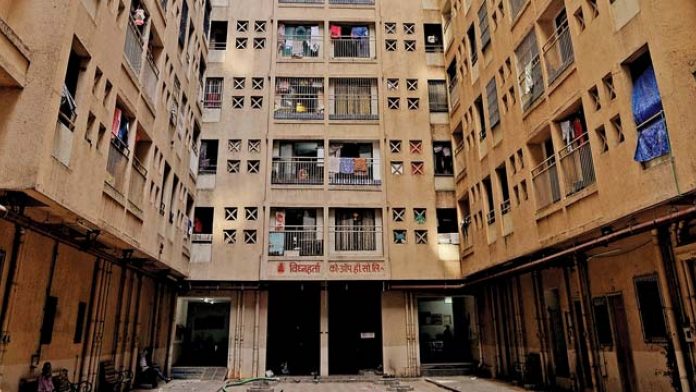This article is written by Amit Prabhu, pursuing a Certificate Course in Insolvency and Bankruptcy Code from LawSikho.com. Here he discusses “Are there any norms for charging society maintenance expenses under RERA or other laws in Mumbai”.

Society maintenance charges are routine and mandatory expenses levied on the flat-owners or members within a co-operative housing society. Maintenance expenses are all-pervasive and levied even in case of commercial or industrial premises operating within the city. The objective of maintenance charges is dual. Firstly it provides for recovery of routine, stipulated and common charges viz. property tax, water tax, property insurance, power/electricity charges, security charges, upkeep, housekeeping etc., which are essential for the smooth functioning of the premises and levied only on the common areas. Additionally, it provides for collecting the regular and reasonable contribution towards major repairs that could be encountered in the future by way of a reserve fund and sinking fund. This enables replacement of depreciating assets in the future without levying an additional burden on the members at that point in time. Thus the amount so collected from members is utilized towards payment of regular overheads listed above as well as for any unforeseen events that may be encountered in the future.
While maintenance charges in an operational co-operative housing society are generally calculated as per the guidelines stated under Maharashtra Ownership of Flats Act (MOFA) 1963, in case of under-construction projects, real estate developers often charge advance or up-front maintenance charges when allottees book the apartments, in some real estate projects, the builder commits to maintain the projects for a few years initially, and then the builder recovers a maintenance charge for this, payable by the purchaser/allottee either in lump-sum or in instalments. Sometimes in addition to this, the builder also requires the purchaser/ allottee to pay a lump-sum amount towards a building maintenance corpus. These practices are not contrary to the provisions of the RERA Act, and therefore acceptable, but they shall be subject to the following conditions: a) the money charged to the purchaser/allottee for building maintenance or as a contribution to a corpus fund does not constitute an income to the builder. Therefore, the builder cannot deposit the money so recovered into his company account. b). the builder is required to open separate bank accounts for building maintenance corpus and building maintenance charges into which these amounts should be deposited. c). any interest earned on these amounts will not accrue to the builder but would accrue to the same accounts. d). The builder is required to maintain separate accounts to be certified by a Chartered Accountant showing the annual expenses from these bank accounts, ensuring that the money has been exclusively spent for the purpose intended. e). in case where the builder has given possession to allottees without making arrangement for domestic electricity connection, and consequently undertakes to pay difference between the higher rate charged by and the normal rate for the domestic connection, this difference cannot be charged to the maintenance account, but must come out of the builder’s own resources. f). At the time of hand over of maintenance to the Residents Welfare Association (by whatever name called) the builder shall also hand over the balance amount in each of the bank accounts relating to the maintenance, as well as a copy of the description of Income and Expenditure statement duly certified by the Chartered Accountant. g). The basic principle is that the maintenance accounts are only managed by the builder in trust for a limited period, on behalf of the Residents Welfare Association, and does not constitute a stream of income for the builder. According to Real Estate (Regulation and Development) Act 2016 (“RERA”), the promoter or project developer is responsible for providing and maintaining essential and common services at a reasonable charge payable by the flat purchasers till the time the co-operative housing society or a residents’ welfare association is formed. Section 11(4)(d) of RERA states that the promoter is liable for provision and maintenance of essential services, on a reasonably chargeable basis, till the event where project maintenance is taken over by the allottees’ association. Section 11(4)(g) of RERA further states that the promoter is responsible to pay all expenses till the time he transfers physical possession of the real estate project to the allottees’ association, which the promoter has collected from the allottees, for payment of expenses/overheads. If the promoter fails to pay all or any of the outgoings collected by him from the allottees, mortgage loan and interest thereof prior to transferring the project to such allottees’ association, the promoter will continue to remain liable, post the property transfer, to pay all such outgoings and penalty charges (if any) to authorities to whom they are to be paid and be liable for the expenses of any legal proceedings, which may be undertaken by any such authority.
Once such a co-operative housing society or allottees’ association is formed, the title and maintenance of the project are formally handed over and taken care of by the said society or association thereafter. Thus the society or association has the authority and right to formulate its own guidelines for levying and collecting maintenance charges. In the case of new projects, the builder indicates a broad range of maintenance charges as there is no clarity on the actual charges which could be payable going forward. The promoter is liable to undertake maintenance using the funds collected from flat purchasers till the time of formation of society and handover of title as mentioned before.
We have seen the modalities of maintenance charges in case of under-construction projects or in cases where conveyance hasn’t been handed over to the co-operative society. Hereafter the article will cover computation and levy of maintenance charges in case of existing co-operative housing societies. The monetary contribution collected from the flat-owners or society members towards maintenance charges is covered under bye-law no. 65 of Model Bye-Laws of Co-operative Housing Society (“bye-laws”). It prescribes that maintenance charges to be collected from members are related to (a) Property taxes (b) Water taxes (c) Electricity charges incurred for common areas and lift (d) Contribution to sinking fund (e) Contribution to reserve fund (repairs and maintenance) (f) Expenses towards repairs and maintenance of society lifts, including overheads for operating the lift (f) Parking charges for vehicles (car and two-wheeler) (g) Interest or penalty on default or outstanding payments (if any) (h) Repayment of the loan and interest instalment (if any) (i) non-occupancy charges (if any) (j) Property insurance charges (k) House-keeping and upkeep (l) Non-agricultural tax or assessment (m) Education and training fund (n) Election fund (if any) (o) Any other expenses.
Additionally, bye-law no. 66 of the bye-laws prescribes the managing committee to levy and collect service charges towards the expenses such as:
- Property tax, electricity and water charges for society’s independent office (if any)
- Expenses incurred on printing, stationery, postage and courier
- Audit fees of internal and statutory auditor
- Expenses incurred for the general body, annual general meeting and managing committee meetings
- Applicable entrance fees towards affiliation to a housing federation
- Sitting fees (if any) paid to the managing committee members of the society
- Yearly subscription charges to whichever federation the co-operative housing society is affiliated
- Payment of monthly wages / salaries of liftmen, office staff, gardeners, security agency / watchmen or any other personnel employed by such society
- Travelling Allowance/conveyance charges to the staff and managing committee members for undertaking any official work on behalf of the society
- Statutory enquiry fees, legal charges and retainer fees
- Subscription to the education fund of the Maharashtra Rajya Sahakari Sangh Ltd.
- Any other expenses or overheads approved by the general body at its meeting, which does not contradict the bye-laws of the society.
Further, bye-law no. 67(a) stipulates the way in which charges are to be shared by the members on the following basis:
- Applicable property tax levied by the local authority (in this case the municipal corporation)
- Applicable Water Charges on the basis of total number and size of inlets provided in each apartment
- Sinking fund as provided under bye-law no. 13(c)
- Vehicle parking charges as fixed by the society’s general body during its meeting (bye-laws 84 and 85)
- Society Service Charges divided equally among number of flats/units
- non-occupancy charges as fixed under bye-law no.43(b)(iii)
- For meeting expenses of normal and recurring repairs, overheads on building repairs and maintenance as per the rate fixed by society general body, provided it is minimum 0.75% (per year), of the construction cost of each flat
- Levying interest on the delayed payments as prescribed under bye-law no.72 to be recovered from defaulting member
- Lift repairs and maintenance inclusive of expenses for operating the elevator to be borne equally by all society members, irrespective of whether they use it or not
- Repaying the loan and interest installment of fixed by the financing agency
- Non-agricultural tax/assessment according to the built-up area of each apartment / unit
- Insurance expenses calculated on the basis of built-up area of each flat. In case of an increase in the insurance premium due to storage of any specific goods inside any apartment, where such apartment is used for commercial purposes, then the additional charges of insurance premium shall be borne by those members who are responsible for the increased premium in proportion of their flat’s built-up area
- Election fund to be borne equally by the members as prescribed by the authorities
- Education & training fund at the rate of Rs.10 per apartment per month
- Any other expenses as decided by the society’s general body meeting
Thus it is clear that in case of co-operative housing societies based in Mumbai, the model bye-laws for co-operative housing societies stipulated under Maharashtra Ownership of Flats Act (MOFA) 1963 prescribe the norms for charging maintenance expenses.
Sources:
- Model bye-laws of co-operative housing society
- The Economic Times (dated 18th Oct 2019)
- www.commonfloor.com
- http://www.rera.mp.gov.in/upload/files/141514066554.pdf
Students of Lawsikho courses regularly produce writing assignments and work on practical exercises as a part of their coursework and develop themselves in real-life practical skill.
https://t.me/joinchat/J_0YrBa4IBSHdpuTfQO_sA
Follow us on Instagram and subscribe to our YouTube channel for more amazing legal content.
 Serato DJ Crack 2025Serato DJ PRO Crack
Serato DJ Crack 2025Serato DJ PRO Crack









 Allow notifications
Allow notifications


